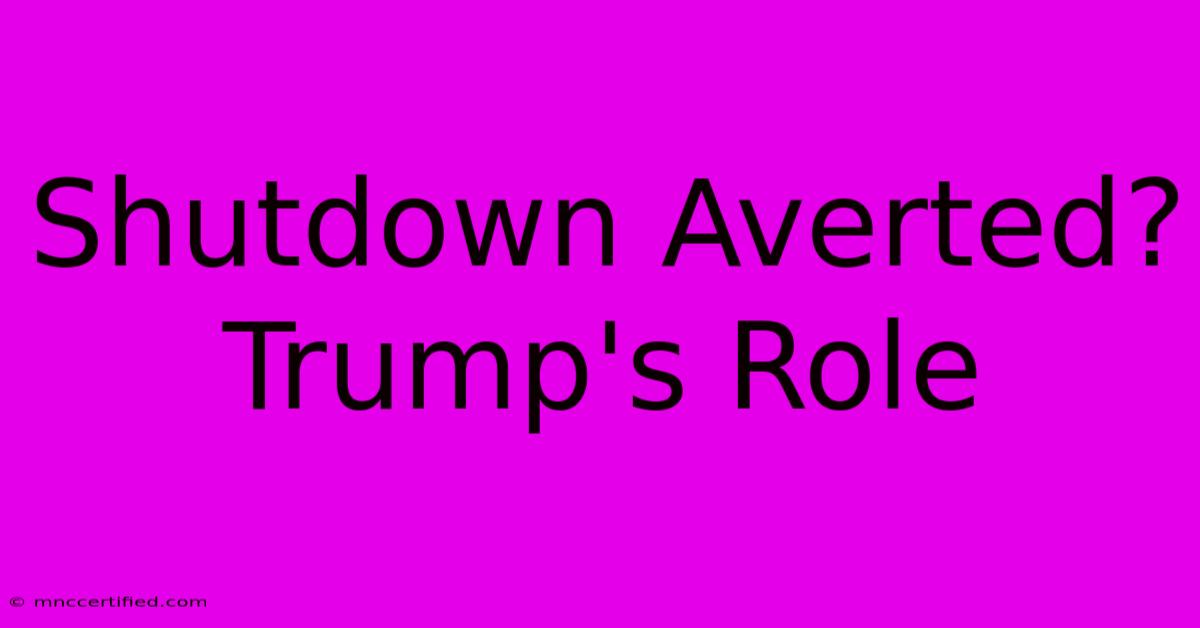Shutdown Averted? Trump's Role

Table of Contents
Shutdown Averted? Trump's Role: A Complex Legacy
The near-constant threat of government shutdowns has become a grim feature of the American political landscape. While shutdowns have occurred under various presidencies, the era of Donald Trump saw several close calls and a unique blend of brinkmanship and last-minute deals. Understanding Trump's role in these near-shutdown situations requires examining his actions, rhetoric, and the broader political context. This article delves into the complexities surrounding Trump's influence on government shutdowns, exploring both the averted crises and the lasting impact of his policies.
The Art of the Deal (or the Threat of Shutdown)?
Trump often employed a strategy of negotiating from a position of perceived strength, frequently using the threat of a government shutdown as leverage. This approach, while sometimes successful in achieving short-term gains, often exacerbated existing political divisions and fueled uncertainty. The key question becomes: was Trump's role in averting shutdowns a result of skillful negotiation, or merely a consequence of last-minute compromises born out of the pressure of impending crisis?
Key Shutdown Standoffs During the Trump Presidency:
- The 2017-2018 Shutdown: This partial government shutdown, the longest in history at the time, centered around disagreements over funding for a border wall with Mexico. Trump's hardline stance initially appeared to hinder a resolution, highlighting the potential consequences of his negotiating tactics. However, the eventual agreement, though heavily criticized by some, ultimately averted a prolonged shutdown.
- The 2018-2019 Shutdown: Similar themes of border wall funding dominated this shutdown, showcasing the recurring nature of the issue and Trump's unwavering commitment to his campaign promise. Again, the brinkmanship involved created significant uncertainty and disruption, with lasting impacts on various government agencies.
- The 2019 Budget Deal: While technically avoiding a complete shutdown, this episode featured tense negotiations and disagreements over funding levels, demonstrating the ongoing tension surrounding budget appropriations and Trump’s influence.
Analyzing Trump's Influence: A Multifaceted Perspective
Trump's role in averting shutdowns cannot be understood in isolation. Several factors contributed to both the near-crises and their eventual resolutions:
- Political Polarization: The deeply divided political climate under Trump exacerbated the already challenging process of budget negotiations. The deep partisan rifts hindered compromise and fueled the brinkmanship that characterized these episodes.
- The Role of Congressional Republicans: While Trump championed certain policies that led to near-shutdowns, the Republican-controlled Congress often played a crucial role in navigating these crises. Their actions, or lack thereof, significantly influenced the final outcomes.
- Public Opinion: The public response to threatened shutdowns and the resulting disruption undoubtedly influenced the negotiating positions of both Trump and Congress. Understanding the public mood during these periods is vital to analyzing the outcomes.
- Trump's Negotiating Style: Trump's distinctive negotiating style, characterized by aggressive tactics and a willingness to push boundaries, played a significant part in both creating and resolving the tensions that often led to the threat of shutdowns.
The Lasting Impact: Beyond the Averted Crises
The near-shutdown events during the Trump administration had lasting impacts, far exceeding the immediate consequences. These impacts include:
- Erosion of Trust in Government: The frequent threats of shutdowns contributed to a growing sense of distrust and instability in the government, impacting public confidence and effective governance.
- Damage to Government Operations: Even narrowly averted shutdowns caused significant disruptions to various government agencies, hindering their ability to provide essential services.
- Increased Political Polarization: The repeated brinkmanship surrounding budget negotiations further polarized the political landscape, making future compromises even more difficult.
Conclusion: A Legacy of Brinkmanship
Whether Trump's actions ultimately averted shutdowns through skillful negotiation or simply avoided them through last-minute compromises remains a subject of debate. However, his presidency undeniably left a legacy marked by a pattern of near-government shutdowns and a heightened level of political uncertainty. The lasting impacts of these episodes continue to shape the American political landscape and highlight the urgent need for effective bipartisan cooperation in managing the federal budget. Understanding this complex legacy is crucial for navigating future challenges and ensuring a more stable and predictable political system.

Thank you for visiting our website wich cover about Shutdown Averted? Trump's Role. We hope the information provided has been useful to you. Feel free to contact us if you have any questions or need further assistance. See you next time and dont miss to bookmark.
Featured Posts
-
Capital Dj Rescued By Chiswick Rnli
Dec 19, 2024
-
World Champions Team Triumphs
Dec 19, 2024
-
Keely Hodgkinson A Racing Spirit
Dec 19, 2024
-
Inflation Hits 2 6 In Uk
Dec 19, 2024
-
Government Shutdown Trumps Musk Response
Dec 19, 2024